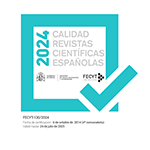Palimpsest and carnivalization: Marcel Camus’ "Orfeu negro"
Abstract
Film director Marcel Camus’ Orfeu negro actualizes Orpheus’ classical myth and transplants it into Rio de Janeiro’s carnival in the 1950’s. Working on the interartistic connections between Virgil’s and Ovid’s narrative poems, on the one side, and the film, on the other, we use Gérard Genette’s theoretical concepts about hypertextuality to study the processes of formal and thematic transposition that lead to consider Orfeu negro as its classical hypotext’s parodie. The diegetic transformation visible in the movie generates amplification in the form of new characters, secondary stories and visual details for the city of Rio that also depict Brazilian customs. Carnival’s presence as a theme and its allegorical meaning will also be studied in relation to an implicit challenge to the establishment and to a more or less effective counterideology, both of which will be analyze using Mijail Bakhtin’s concept of carnivalization.Downloads
Article download
License
In order to support the global exchange of knowledge, the journal Cuadernos de Filología Clásica. Estudios latinos is allowing unrestricted access to its content as from its publication in this electronic edition, and as such it is an open-access journal. The originals published in this journal are the property of the Complutense University of Madrid and any reproduction thereof in full or in part must cite the source. All content is distributed under a Creative Commons Attribution 4.0 use and distribution licence (CC BY 4.0). This circumstance must be expressly stated in these terms where necessary. You can view the summary and the complete legal text of the licence.








